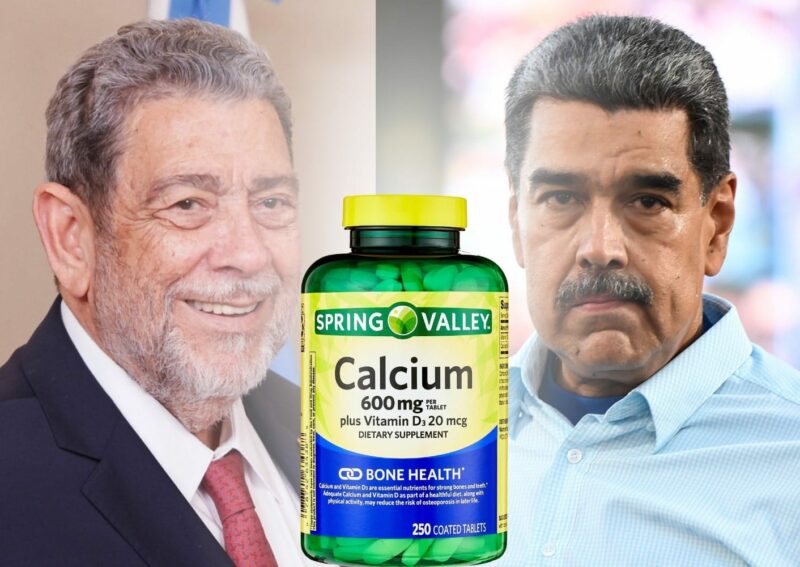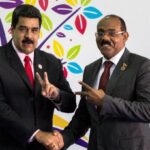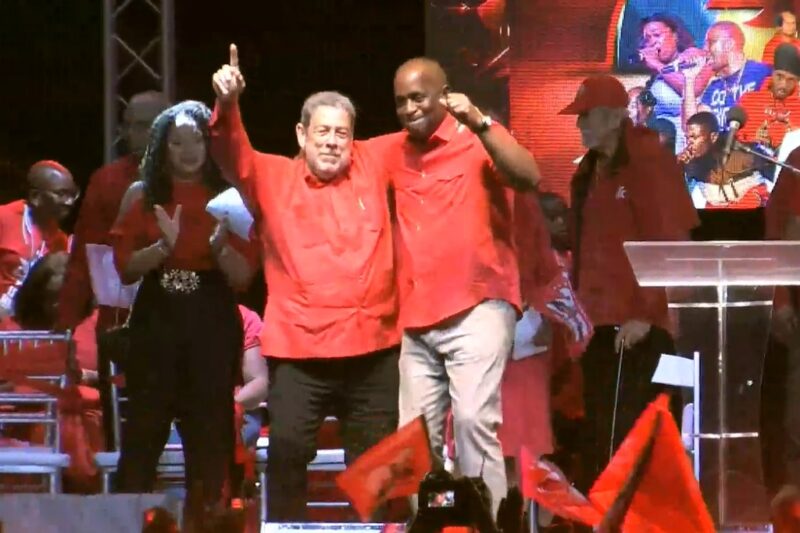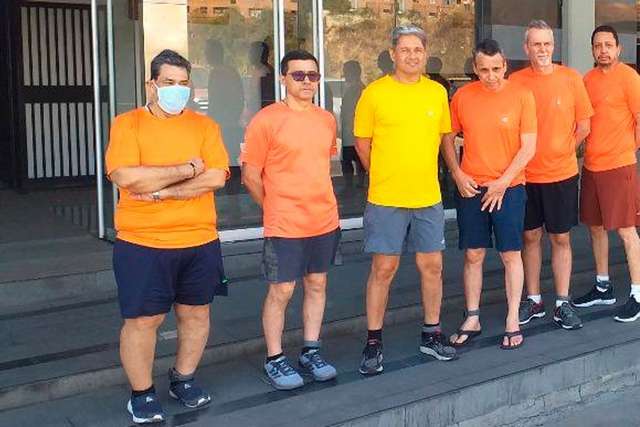
Why is having enough calcium in our diets important? Our bodies need calcium for muscles to move, for nerves to carry messages between the brain, for blood vessels to move blood throughout our bodies, to release hormones, and for bone health. It is difficult to imagine that any of us in the Caribbean could ever suffer from a calcium deficiency when we are force-fed a steady diet of Dr. Ralph Gonsalves’ calcified views on the Venezuelan crisis.
It was recently reported that Gonsalves, the Vincentian Prime Minister, while in Guyana for the funeral of the late statesman Sir Shridath Ramphal, told a reporter that Maduro’s purported victory – which has been widely condemned as fraudulent – was in Guyana’s best interest, or at least, that of its oil sector. Dr. Gonsalves was swift to publicly congratulate Venezuelan President Nicholas Maduro on his fraudulent election victory in July.
“The Venezuelan people have spoken in a free, fair and democratic process,” he declared. He expressed his hope that all of the Caribbean Community (CARICOM) would issue a joint statement “congratulating Maduro on his re-election to the presidency” calling the Venezuelan President an “important partner” who was “important for peace and security in our region, including peace and security on the border with Guyana.” Gonsalves was also quoted by the St. Vincent Times recently, saying of the US and its allies: “Imperialism cannot speak to me about free and fair elections.”
Is this man serious? Let us be clear: The administration of Nicholas Maduro in Venezuela has kept itself in power for the last two election cycles by repressing political opposition in that country year round, turning its state security and secret police against the population, consolidating power in key state institutions, and engaging in electoral fraud. It is past time for Dr. Ralph Gonsalves to desist from being a cheerleader for an authoritarian whose political track record is replete with power grabbing and disdain for democracy.
Maduro, previously the Vice President of Venezuela, came to power in 2013 as Acting President after the death of President Hugo Chavez. Chavez was a charismatic populist and socialist leader who led what is known as the Bolivarian Revolution – a process of political reform aimed at building things such as nationalism, a welfare state, a state-led economy (including through nationalisation), Latin American sovereignty (anti-imperialism), economic self-sufficiency, and sovereignty over natural resources. Chavez was a champion of the poor and painted himself as an enemy of the upper class.
Considerable state profits from oil during the start of his administration in 2002 allowed for programmes that hugely impacted poverty, access to food, housing, literacy, income equality, as well as quality of life. Ultimately however, his government’s economic policies, and his declared war against Venezuela’s upper class led to cracks in the economy over time particularly as record oil profits from the early 2000s diminished. Under his governance, Venezuela experienced democratic backsliding. He was accused of suppressing the press, manipulating electoral laws, and arresting and exiling government critics
When Maduro came to power upon Chavez’s death in 2013, the movement led by Chavez was already weakened. A subsequent Presidential election that year saw Maduro winning, but by a very narrow margin. It was a highly divisive election which the Opposition later encouraged its supporters not to recognise, sparking protests which were repressed, all of which contributed to the deeper and deeper polarisation of the country after more than a decade of Chavez’s policies. But this election was seen as mostly free and fair. Venezuelan elections go downhill from here.
When opposition parties won legislative elections in 2015 for the National Assembly, it sparked a political conflict with Maduro, as the Legislature made attempts to remove him. He, in turn, took steps to oust the Legislature. Venezuela’s Supreme Court, sympathetic to Maduro, stripped the opposition-majority Legislature of its power, causing a constitutional crisis.
The Supreme Court was by then tainted by judges appointed by Nicholas Maduro’s ruling party. After the results of the Legislative elections in 2015 became clear, Maduro’s outgoing lame duck MPs used their remaining time to hurriedly appoint 13 main justices and 21 supplementary justices to the Supreme Court. The Supreme Court appointments were condemned as illegal by many for ignoring a series of constitutionally required steps that mandate review periods and various checks prior to final confirmation of judges.
When the Supreme Court ousted the Legislature – which was trying to oust Maduro – it sparked mass protests in 2017. In 2017, Human Rights Watch (HRW) reported that the government responded to protests over the Supreme Court’s attempt to steal power from the Legislature with “widespread violence and brutality against anti-government protesters and detainees” saying that “the scope and severity of the repression reached levels unseen in Venezuela in recent memory.”
“Security forces and armed pro-government groups attacked protesters in the streets, using extreme and at times lethal force, causing dozens of deaths and hundreds of injuries. Authorities detained thousands of protesters and bystanders, many of whom have been subsequently prosecuted in military courts. The crackdown has extended beyond the protests, with government intelligence agents pulling people from their homes or detaining them on the streets even when no demonstrations were taking place.”
Amidst the protests, Maduro further consolidated power by essentially creating a new Legislature to circumvent the National Assembly. His government organised the election of a “National Constituent Assembly” – an elected body whose job would ostensibly be to draft a new Constitution. Opposition parties boycotted the elections to the new body, calling it illegitimate. Members of Maduro’s political alliance were elected exclusively. While it never drafted a new Constitution, the body declared itself to be the supreme power in Venezuela, and declared that it was stripping the actual National Assembly (opposition-majority) of power.
In May 2018, Maduro ran for his second Presidential term, winning an election that was condemned as neither free nor fair. Many prominent opposition parties such as Justice First and Popular Will, were banned. Notably, the elections had the lowest voter turnout in Venezuela’s democratic history. Some major opposition parties boycotted the polls altogether, which were moved up and held ahead of time by months by the Maduro government.
After the 2018 elections, the opposition controlled National Assembly declared Maduro illegitimate and named the Chair of the National Assembly, Juan Guaido as the Acting President in 2019 based on their interpretation of certain provisions of the Constitution. This set off a Presidential crisis that lasted four years and which saw both Maduro and Guaido competing for international recognition.
In 2019, the United Nations (UN) Office of the High Commissioner for Human Rights (UNHCR) detailed how state institutions had been “militarised” in Venezuela and how “civil and military forces have allegedly been responsible for arbitrary detentions; ill-treatment and torture of people critical of the Government and their relatives; sexual and gender-based violence in detention and during visits; and excessive use of force during demonstrations.”
The UNHCR noted, “Pro-government armed civilian groups, known as colectivos, have contributed to the deteriorating situation by exercising social control and helping repress demonstrations. The incidence of alleged extrajudicial killings by security forces has been shockingly high. In 2018, the Government registered 5,287 killings… Between 1 January and 19 May this year, another 1,569 people were killed, according to Government figures. Other sources suggest the figures may be much higher.”
In 2020, Erika Guevara-Rosas, Americas director at Amnesty International, was quoted saying, “The authorities under Nicolás Maduro have made repeated and sustained attempts to dismantle any form of political dissent in the country, committing serious human rights violations including the use of torture, enforced disappearances and arbitrary detention.”
That year, the Maduro sympathetic Supreme Court usurped the role of the National Assembly and appointed new members to Venezuela’s electoral body, the National Electoral Council (CNE) further consolidating power over the electoral process in the country. Unsurprisingly, in 2021, a UN fact-finding mission found that Venezuela’s justice system has played “a significant role” in the state’s repression of government critics and that Venezuela’s judiciary lacked independence and had allowed serious human rights violations to go unchecked. .
In 2022, UN experts determined that Venezuela’s intelligence agencies were committing “crimes against humanity” as part of a government-backed attempt to repress dissent. A UN report noted that there was evidence to show how Maduro himself and others in his inner circle were involved in selecting targets for detention by intelligence agents, including political opponents. In 2023, Amnesty International reported that “victims of politically motivated arbitrary detentions” between 2018 and 2022 included “teachers, trade unionists and human rights defenders.”
In 2023, Maduro’s government held a referendum on annexing the Essequibo – a region comprising more than half of Guyana – over a longstanding colonial-era claim Venezuela has maintained over the territory. It sparked a political and security crisis for Guyana that required the intervention of Gonsalves and several other leaders to bring about a momentary cessation in Venezuela’s sabre rattling. Several political analysts in the region characterised the move by Maduro as intended to drum up political support through nationalistic fervour ahead of elections in 2024. In March 2024, Venezuela went ahead and annexed the Essequibo on paper, though not in practice, as no military action was taken to seize it.
In July 2024, Maduro ran for office for his third term, with the National Electoral Council in Venezuela declaring him the victor. His government barred the main opposition leader, María Corina Machado from participating in the polls, and there was repression of the opposition before, during and after the election. Most obscene is the fact that the Maduro sympathetic Electoral Council has flatly refused to provide actual polling figures from the various polling stations across the country or an actual total vote count.
To put that into context, that would be like the Antigua and Barbuda Electoral Commission (ABEC) declaring a victory for the governing party in the last general election, but refusing to publish the numbers of how many people actually voted for each of the candidates in the various constituencies, or of how many people actually voted overall. The Carter Center, which observed the process, said it “did not meet international standards of electoral integrity at any of its stages and violated numerous provisions of its own national laws.” Numerous UN experts have reached similar conclusions.
The opposition has provided its own vote tallies, showing a landslide victory for their candidate, former diplomat Edmundo González Urrutia. Unsurprisingly, the Supreme Court affirmed the election result nevertheless. Numerous observers have said there is no democratic precedent for declaring a winner in an election without tabulated results. Candidate Gonzalez has now fled to Spain where he has been granted asylum, as a wave of repression is again unleashed on protesters who have come out to decry the Maduro regime.
In September, the UN reported that “Venezuela’s Government has dramatically intensified efforts to crush all peaceful opposition to its rule, plunging the nation into one of the most acute human rights crises in recent history.” Meanwhile, the UNHCR has written: “In the period leading up to the elections, from December 2023 to March 2024, at least 48 people were detained on the grounds of what the Government described as conspiracies against it, and arrest warrants were issued for others. These individuals include military personnel as well as human rights defenders, journalists, and members of the political opposition.”
“In July alone, the mission documented over 120 people arrested in the context of opposition campaign events. In the first week of protests following the elections, according to figures from the authorities themselves, more than 2,000 people were detained. These individuals, including over a hundred children, some with disabilities, were accused of terrorism and incitement to hatred.”
So, why is Prime Minister Dr. Ralph Gonsalves still supporting the Venezuelan regime? Because like so many of our leaders and our Caribbean political thinkers, academics, and intellectuals, he exists in a bygone era where the only battle that can be fought is the battle between the masses and the oppressor, or the imperialists and the anti-imperialists, or the proletariat and the capitalist, or the West and the East, or the leftwing and the rightwing. It is a tired, exhausting, and myopic worldview that has not adapted to the fact that the Cold War ended.
Think back to his reference to “imperialism”. For Gonsalves, the US will always be the hegemonic oppressor of Latin America and the Caribbean, meddling in national affairs in support of rightwing allies, while leftists movements, no matter how autocratic, vile, and repressive, will always be the salvation of the common people. If you have ever been on a University of the West Indies (UWI) campus and had to endure lectures on Caribbean political thought, you will find the excessive focus on tired, worn out, stale Marxist theory suffocating to the point of death.
This sort of thinking tends to lock Caribbean people into a certain inflexible worldview that is unable to adapt to what is actually happening in the world. Despite the breadth of evidence pointing to the brutality and repressive nature of the Maduro government and the electoral fraud in which it has engaged, Maduro can bank on Dr. Gonsalves’ support merely by continuing to cast himself as a leftist liberator of working class people who is in the sights of a US backed right wing alliance who want to oppress the people and give power back to the capitalists.
Nevermind the abhorrent mismanagement of Venezuela’s economy that has caused hyperinflation, shortages, worsening poverty and mass emigration. Perhaps we should ask our CARICOM brethren what they think. What does Guyana think about the Maduro administration that just passed a law this year to annex half their country? What does Trinidad andTobago think about the situation in Venezuela when it has been bearing the brunt of emigration more than most other CARICOM countries? Gonsalves’ open support for Maduro’s legitimacy is disgraceful.
Truthfully though, we haven’t even spoken about the elephant in the room. Venezuela has bought and paid for the support of much, if not all of the CARICOM bloc, through Chavez’s PetroCaribe programme and other Venezuelan sponsored initiatives like PDV Caribe that have benefited the region economically and socially. Up and down the Caribbean, these programmes have delivered cheaper energy and social initiatives to assist the most vulnerable. Added to that, debt forgiveness has been extended to Caribbean governments with the hundreds of millions owed under the schemes being halved or wiped off completely in different instances.
Venezuela has played the soft power game well. Much like China, they have bought the friendship of the Caribbean en masse by lavishing us with money they can afford to lose in order to support us in ways that we don’t want to see dry up, thereby leaving our throats very very dry when it comes time to speak up at the UN, the OAS and elsewhere. The truth is, we know how we got here. As for Dr. Gonsalves, it is clear that he truly views himself as a friend of Venezuela, albeit just not of the people fighting for their democracy. When will he see Muduro for the autocrat that he is?
About the writer:
Kieron Murdoch worked as a journalist and later as a radio presenter in Antigua and Barbuda for eight years, covering politics and governance especially. He is an opinion contributor at antigua.news. If you have an opinion on the issues raised in this editorial and you would like to submit a response by email to be considered for publication, please email [email protected].






The introduction to this article had me laughing out loud—I couldn’t help but love it! 😆
Was this journalist part of an official observer group during the recent Venezuela elections, or are we just sounding off to appease the right wing factions now seeking office in the US. If Murdoch wants to appear cerebral, let’s engage the public on the topic of the subhuman treatment of the Government and people of Cuba. The Venezuelan so called crisis is more a figment of the mindset of corrupt U S policymakers.
Not at all impressed by the airing of the editor’s biased views
Well said. The US is only concerned about it’s own interests and that is OIL. Wherever there is oil they will do everything to destabilize that area. Soon they will start some kind of conflict in that region just to get a foothold in the name of “Democracy” and some such as Mr Murdock fall for it hook line and sinker.
It doesn’t always have to be a US conspiracy you know. Sometimes you just have a corrupt authoritarian doing dumb sh**. It happens all the time.
Wow. That’s your response to this? Do you deny the veracity of the reporting by Amnesty International, the UNHCR, the UN, and other such bodies?
Gonsalves is guzzling down the kool-aid which mad-ura has been supplying him with.